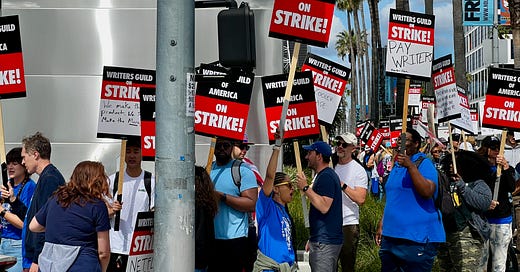

Discover more from The Owner's Guide to the Future
WGA versus AI
Why the world's first organized labor action against AI is necessary... and doomed
Last week I returned from a trip to the East Coast. As the taxi rolled through Hollywood, I noticed that the sidewalks were thronged picket lines. In front of the movie studios, sound stages, and the Netflix offices, large groups of demonstrators were marching in orderly rows.
The strike was on! For the second time this century, the 11,500 members of the Writers Guild of America were picketing the studios and media companies.
This time, in addition to fighting for the usual demands like better residuals and working conditions, the WGA is also demanding something new: protection from artificial intelligence.
Specifically, the writers seek to limit the use of generative AI programs like ChatGPT in their craft.
My view: This is the perfect occasion for the WGA to strike against generative AI. And yet, paradoxically, it’s already too late. Efforts to halt the rollout of artificial intelligence are doomed to fail. The advent of open-source language models makes proliferation of AI a certainty. Artificial intelligence will continue to get better, cheaper, and ubiquitous. And it is already being tested in every aspect of entertainment production.
There’s no way to put this generative AI genie back into the lamp.
But the writers have no choice. They must act. There will never be a better time for this showdown than right now.
So it’s game on for a dramatic showdown that will reveal much about the future adoption of a novel technology.
The rest of us ought to be cheering for the WGA. Especially the other professionals who handle complex but formulaic writing. Namely: attorneys, web developers, copywriters, social media marketers and technical writers.
The WGA has leverage that writers in no other profession possess. If the WGA can’t prevail, then none of us can.
My perspectives on this topic will be presented in two parts. In the first part, I will deal with the question: why is this moment the right occasion for the first organized labor action against artificial intelligence? Then, in subsequent editions, I will share why I think this quest probably won’t end the way anyone expects.
Humanity’s last stand
Here’s my big claim in a single sentence: The Writer’s Guild strike represents humanity’s best chance to make a stand for the unique value of our natural creative skills.
I know how absurd that sounds. Give me the opportunity to develop the argument in the next three posts.
Let’s start with this. The WGA is the right organization, with the right leverage, at the right moment in history to launch this quest.
Why now?
As noted in previous editions of this newsletter, the leading technology firms are locked in an arms race, rushing to deploy artificial intelligence in every computer-mediated task. They are too focused on internecine conflict to be concerned about collateral damage. Their only concern is to be first in a winner-take-all contest.
The end game for the internet giants remains the same as always: they intend to foster a new dependency on software that is used by millions, preferably billions, of people worldwide. The grand vision is to bake artificial intelligence into every professional process, into every workplace, and for every industry. Whoever reaches that goal first will win the right to perch on the Iron Throne for the next cycle, raking in hundreds of billions of dollars.
We’ve seen this movie before. Initially, the Big Tech mission was aimed at putting a PC on every desk. That process took two decades. Microsoft and Intel won that round. Then it shifted to putting a smartphone in everyone’s pocket. That was accomplished in one decade. Apple and Google won that round.
Then it shifted to replacing physical goods with digital services. In this conquest, there were several winners: Apple and Google on the app side, and Microsoft and Amazon on the cloud side. These firms succeeded beyond anyone’s wildest hopes, becoming the world’s most valuable companies in the process.
They won. We are hooked. Today it is impossible to conceive of doing business (or booking a restaurant reservation or planning a trip) without using a PC or a smartphone app or some combination. Most businesses have migrated to the cloud.
Big Tech’s Game Plan for AI
That’s why it’s easy to predict what they plan to do next: the tech firms intend to drive a wedge of artificial intelligence software between every worker and her tools. According to this plan, there will soon be a layer of proprietary software between every painter and her canvas, between every writer and their keyboard, and between every student and his homework assignment.
It's also easy to predict how this quest for domination will be marketed to the masses. AI will be presented and sold to us as a benefit: a new superpower, a convenience, a time saver, or some other advantage.
Not that people outside of Silicon Valley will see it that way. At first AI will be perceived as a cute novelty (that’s where we are today), then as a convenience (coming soon), then as a necessity, then as a crutch and finally as an inescapable addiction. Those later steps will occur after we have burnt our bridges, namely, by reorganizing our companies and business process to put machine intelligence in the center.
After that happens, there will be no “going back to the way things were before.” It will be a fait accompli. And that’s when Big Tech can monetize by squeezing every company that is dependent on their AI platform. No wonder they are fighting so fiercely to win this round.
Nobody asked for this.
Certainly, no customer of Microsoft’s woke up one morning with the bright idea of adopting a tool that will literally require every white-collar professional in the world to upskill to new software, new workflow, and a new way to manage tasks. And to pay a new monthly subscription fee. Forever.
That’s why so many people have reacted to AI with a kind of sullen resignation instead of the glee that the technologists expected.
Given a choice, most of us would probably say no.
Sure, okay, a few enthusiasts have embraced generative AI with gusto, but for most workers it is Just One More Damned Thing To Deal With. You know, technology’s bad habit of intruding in unwelcome ways like endless email exchanges over the weekend, learning Salesforce, dealing with incessant Slack chatter, contending with the crappy HR portal, conforming to the cumbersome CMS, wasting time in the clunky corporate learning management system, knowing that the IT department reads your emails and shares them with HR, and so on.
Does any worker experience this stuff as liberating or empowering? Nope.
So who’s really in favor of AI? That’s easy. Employers. They readily accept the claim that it will make the workforce more efficient. And they intuit that it will probably grant employers more leverage and control over workers, too. Just as deskilling manufacturing jobs, outsourcing, and automation shifted power and profit away from the workforce to employers.
Before that occurs, there is a diminishing window of time for some workers take a stand by saying “Enough, already.”
Enter the WGA.
The Writers Guild of America is uniquely capable of waging the battle against AI, far more than unorganized labor like software coders or advertising agency copywriters.
That’s because the screenwriters are backed up with a force multiplier that most other writing professions do not have: other unions. Together they have the clout to bring the media and entertainment industry to its knees. Or at least to the bargaining table.
It just so happens that the WGA contract has come up for renegotiation a few weeks ahead of the Screen Actors Guild and the Directors Guild. This sequence is important, because if these organizations can maintain solidarity, then they will enjoy bargaining power that no other white-collar workers have.
(That’s a mighty big if, and that’s just one reason why the WGA strike may fail.)
To understand the unique bargaining clout that the WGA enjoys, we need to consider how the movie production business works. In tomorrow’s edition of this newsletter, I’ll dive into the way it works here, and why the WGA finds itself in such a pivotal position.












So glad you are tackling this - and as someone who has bridged tech and entertainment my entire career, I have a pretty unique perspective. Looking forward to your next installment. Pass the popcorn!
Excellent article